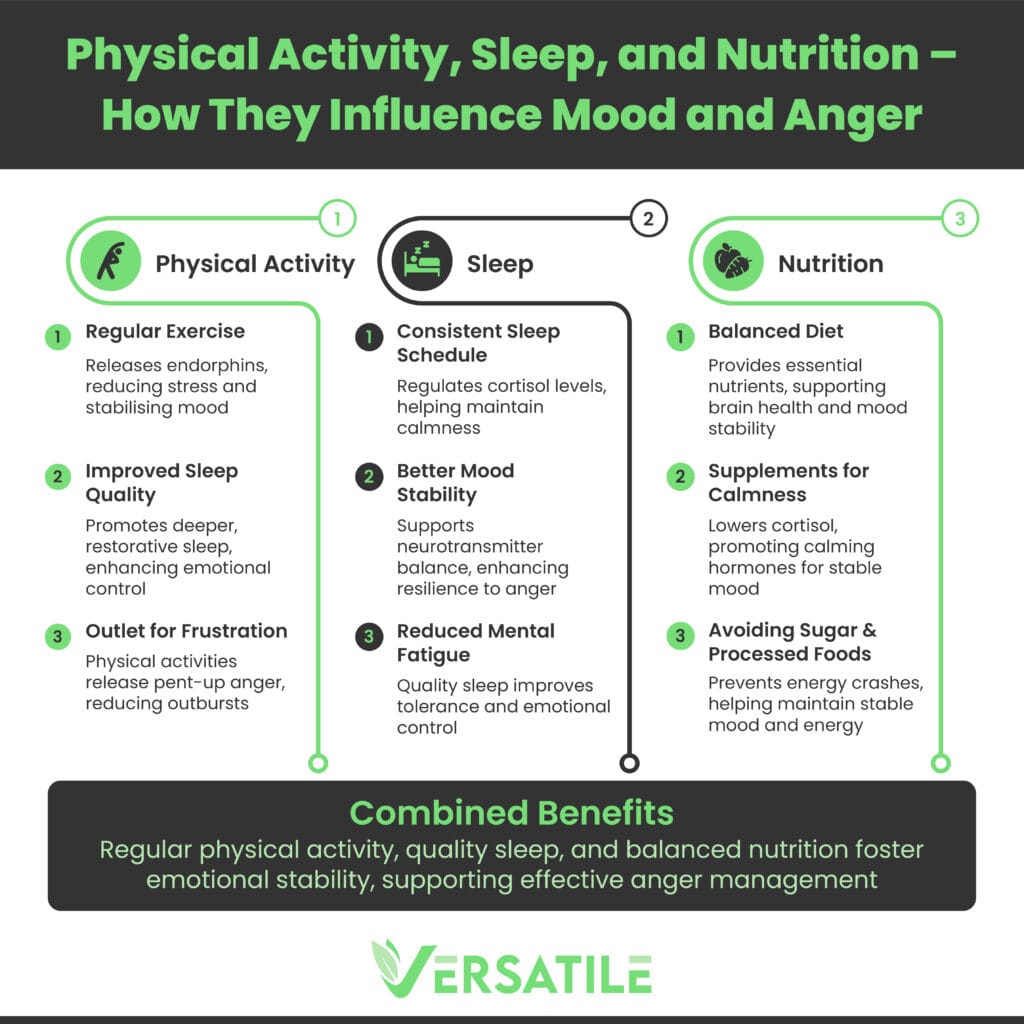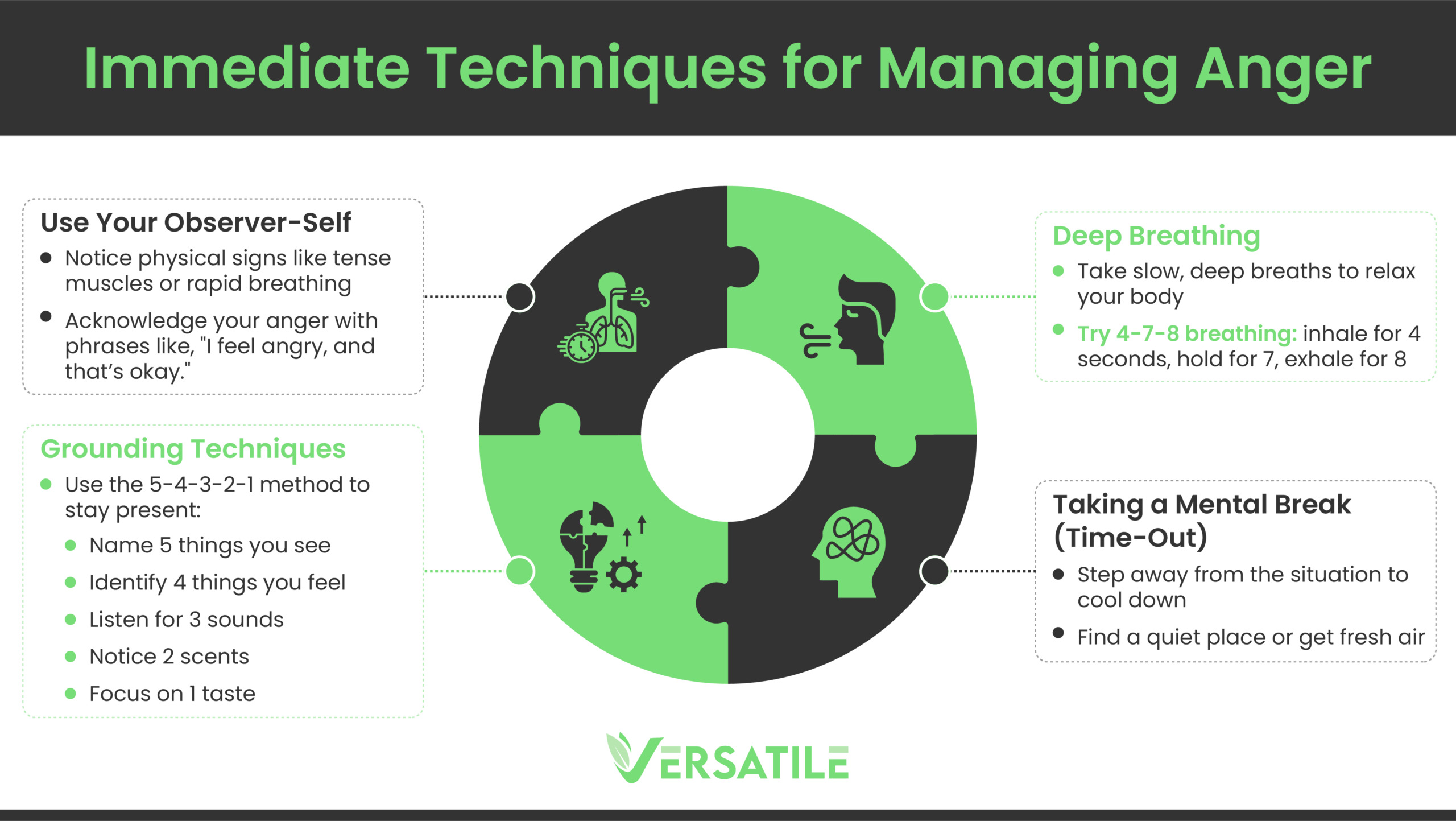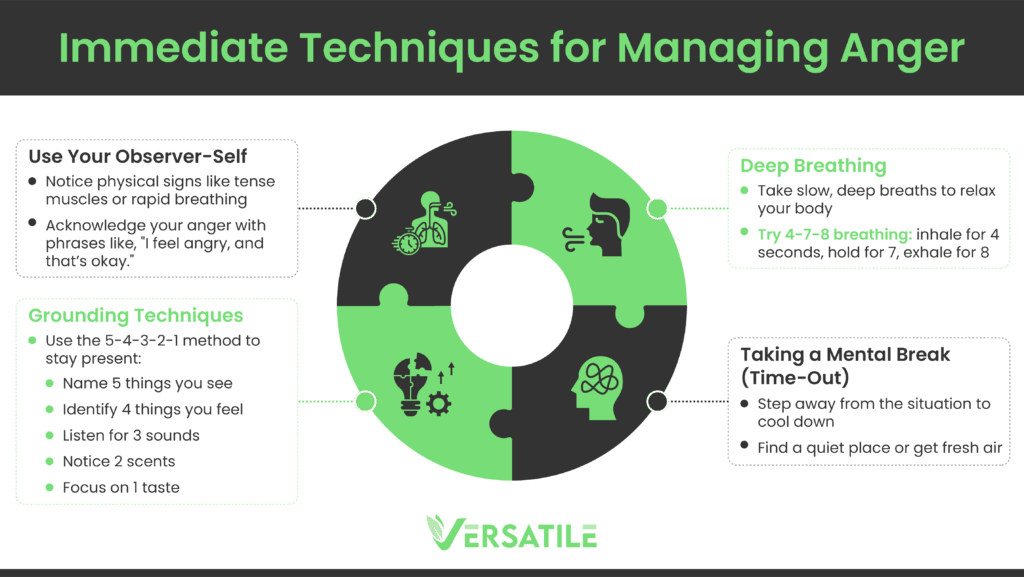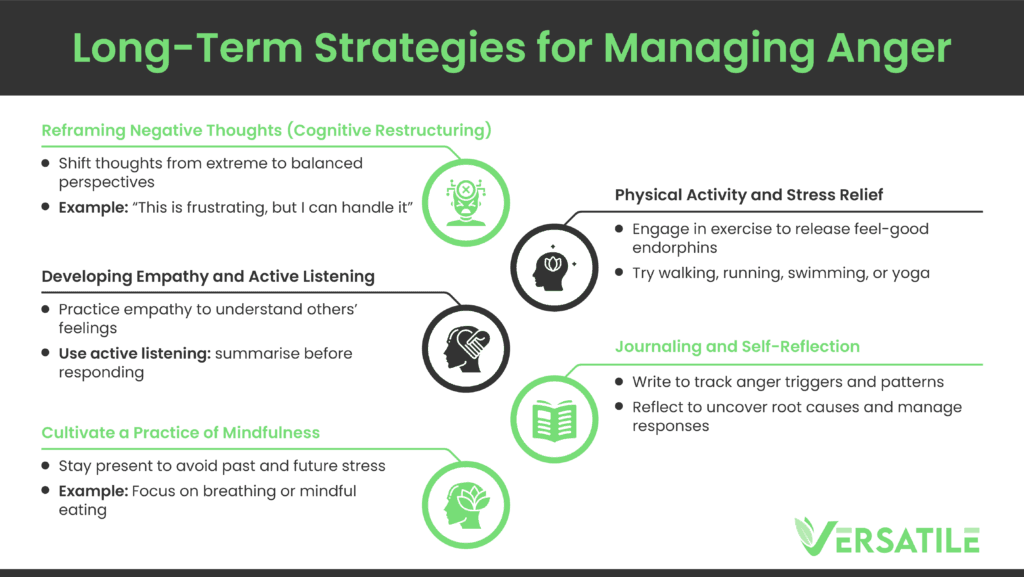Anger is a powerful emotion experienced by everyone at some point in their lives. It’s natural to feel anger, but when it gets out of control, it can harm our relationships, work life, and even our health. The good news is that there are many effective strategies to manage anger, ensuring it doesn’t take over. This article will explore some techniques to use when you start getting angry and long-term strategies to help you stay calm and better handle frustrating situations.
Understanding Anger and Its Triggers
What is Anger?
Anger is an emotional response to perceived threats, frustrations, or injustices. It activates our “fight or flight” response, causing physiological changes like increased heart rate, tense muscles, and a surge of adrenaline.
These responses evolved to protect us, but in today’s world, such intense reactions can lead to negative consequences when not managed effectively.
Anger becomes problematic when it manifests in destructive behaviours—yelling, violence, or internalising feelings. Studies show that uncontrolled anger can also affect physical health, contributing to conditions like high blood pressure, heart disease, and weakened immune response.
Common Anger Triggers
Triggers are events or circumstances that provoke anger. Some triggers are external, like:
- Stress at work
- Traffic jams
- Disagreements with loved ones
- A physical location or place
- Interpersonal relationships
- Social pressures e.g. financial stressors, discrimination and bullying, etc.
Internal triggers include:
- Personal insecurities
- Unprocessed past trauma, e.g. Flashback
- Unmet expectations
- Challenging emotions like feeling lonely or helpless
- Core beliefs
- Mental health challenges like anxiety or depression
- Dissatisfaction with life e.g. having an illness, not meeting personal goals
Triggers are difficult to avoid and they often take us by surprise. It takes time and effort to cultivate awareness of what our triggers are and what we need at that moment to feel better.
Taking a quick time out when we are triggered can give us the time we need to respond appropriately instead of reactively do something we may regret.
Immediate Techniques for Managing Anger
Deep Breathing
One of the most effective ways to calm your body during an anger episode is through deep breathing. When we are angry, our breathing becomes rapid and shallow, which further escalates the situation. Deep breathing, on the other hand, activates the body’s relaxation response.
A highly recommended technique is the 4-7-8 breathing method: inhale for 4 seconds, hold the breath for 7 seconds, and exhale for 8 seconds. This method slows your heart rate and calms your nerves.
Taking a Mental Break (Time-Out)
Sometimes, the best way to manage anger is to step away from the situation. This mental break, or time-out, gives you time to cool down before responding.
Whether you’re in the middle of an argument, or something just made you furious, take a few minutes to walk away, get some fresh air, or sit in a quiet space.
By doing this, you reduce the likelihood of saying or doing something you’ll regret later
Grounding Techniques
Grounding techniques help you stay present when you’re overwhelmed by anger.
One widely used method is the 5-4-3-2-1 technique: name five things you can see, four things you can feel, three things you can hear, two things you can smell, and one thing you can taste. This technique pulls your focus away from the anger trigger and anchors you in the moment.
Use Your Observer-self
Notice the changes in your body, e.g. shallow breathing or clenched jaw, etc. and become aware of the emotion of anger. Just continue to observe the anger that you are feeling.
You may also talk to yourself and say something like, “I notice that I am angry now”, or “Anger is present and that is okay”. When we notice and make space for the emotion, instead of avoiding it or trying to control it, it is likely not to intensify and will become more manageable.
Long-Term Strategies for Managing Anger
Reframing Negative Thoughts (Cognitive Restructuring)
Often, anger stems from distorted thinking, where we view situations in extremes—
“this is a disaster” or “nothing ever goes my way.”
Cognitive restructuring helps us reframe these thoughts into more balanced perspectives. Instead of thinking, “This is awful,” you can reframe it as, “This is frustrating, but I can handle it.”
By changing how we perceive situations, we reduce the intensity of our emotional reactions.
Physical Activity and Stress Relief
Exercise is one of the most effective long-term solutions for managing anger. When we exercise, our bodies release endorphins, the brain’s feel-good neurotransmitters.
These natural chemicals help improve mood and reduce stress. Physical activities such as walking, running, swimming, or even practising yoga can lower the intensity of anger and prevent it from escalating.
Developing Empathy and Active Listening
A common source of anger is conflict with others. When we feel misunderstood or ignored, our emotions can spiral out of control. Developing empathy—the ability to understand and share the feelings of others—can help de-escalate these situations.
One technique for fostering empathy during disagreements is active listening. This involves fully concentrating on what the other person is saying and summarising their point before responding. Empathy and active listening reduce misunderstandings, a common cause of anger.
Journaling and Self-Reflection
Journaling is a powerful tool for anger management. By writing down your thoughts and feelings, you can track patterns and triggers that lead to anger.
Over time, this helps you identify the underlying causes of your frustration. Self-reflection through journaling also provides space to process emotions and develop a greater sensitivity towards when and how you experience anger. This can help you understand how to better handle similar situations in the future.
Cultivate a Practice of Mindfulness
Many people confuse mindfulness with meditation. Mindfulness is actually a practice of being in the present. When we get angry, it is common to dwell on similar past experiences or worry about potential future problems.
Mindfulness draws us back to the present to address only what is going on at this moment. When we are not comparing with the past or anxious about the future, the issue seems more manageable.
Developing a mindfulness practice can be as easy as spending 5 minutes a day focusing on the breath entering and exiting your nostrils or eating one meal a day without any distractions so you can pay close attention to the textures and flavours you are encountering.
Building Healthy Habits to Reduce Anger
Physical Exercise
Physical activity does more than just keep you fit—it plays a critical role in emotional regulation. Regular exercise helps reduce stress, improves sleep quality, and releases the tension that can lead to anger. Activities like running, swimming, or yoga not only keep your body healthy but also provide an outlet for pent-up frustration.
Improving Sleep and Nutrition
Sleep deprivation and poor diet can negatively impact your ability to manage anger. Lack of sleep increases irritability, while an unhealthy diet can affect your mood. Maintaining a consistent sleep schedule and eating a balanced diet rich in nutrients promotes emotional stability and helps prevent angry outbursts. Some studies have also shown that taking supplements such as omega oils, L-Theanine, B vitamins, Ashwagandha and magnesium can have an effect on our moods, reduce cortisol and help the brain produce more calming hormones like serotonin and GABA (gamma-aminobutyric acid).

Recognising When to Seek Professional Help
Signs That Anger Is Affecting Your Life
Anger management isn’t just about handling day-to-day frustrations. Sometimes, anger becomes a significant issue that affects your relationships, work, and health. Some warning signs include frequent arguments, violent outbursts, feeling constantly angry, and difficulty controlling your temper. If you recognise these patterns in yourself, it may be time to seek professional help.
Here are some signs that you may need some support in managing your anger:
- You receive feedback that your reactions when angry are aggressive, disproportionate, or cross a line
- You feel ashamed or regretful about your behaviour when angry
- You tell yourself you won’t react in this way again, but it keeps happening
- You feel afraid or stressed about becoming angry
- You have difficulty remembering what you did or said while angry
- You have harmed yourself or others, either intentionally or unintentionally, while angry
- Anger negatively impacts practical aspects of your life, such as facing disciplinary action at work, experiencing more conflicts with loved ones, or being unable to enjoy hobbies
- Your anger seems to persist for extended periods
How Counselling or Therapy Can Help
If anger has begun to control your life, professional intervention can be highly effective. A trained professional will be able to help you understand your triggers and co-develop healthier ways of responding. There are many different therapeutic approaches to manage anger depending on your goals and the root causes, from Cognitive Behavioural Therapy (CBT) to Acceptance and Commitment Therapy (ACT), Internal Family Systems (IFS) and more. Group therapy or individual counselling can provide valuable insights about anger and support you with strategies for coping with intense emotions.
If you’re ready to go beyond these strategies and learn hands-on tools for mastering anger, join our course, Calm Under Pressure: Tools and Frameworks for Anger Management. This programme dives deep into practical techniques and frameworks to help you better manage your responses, identify triggers, and regain control in challenging moments. Explore how you can lead a calmer, more balanced life by building resilience and adopting sustainable anger management practices.



Reader Interactions